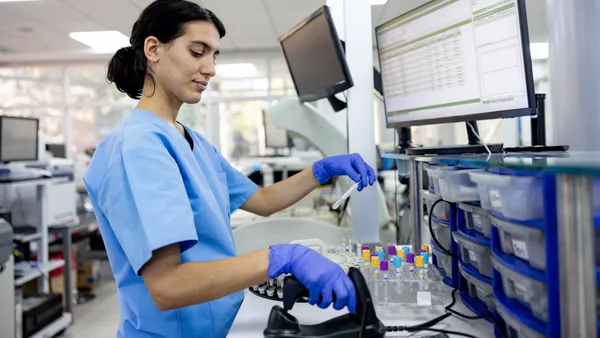The American Clinical Laboratory Association (ACLA) sued the Food and Drug Administration on Wednesday, arguing the agency does not have the authority to regulate laboratory developed tests as medical devices.
The trade group wants the FDA’s final rule vacated, according to a lawsuit filed in the U.S. District Court for the Eastern District of Texas.
The FDA moved forward with the controversial rule in April, tightening its oversight of the widely used tests in an effort to make them safer and more accurate. The agency contends the risks associated with LDTs, a category of in vitro diagnostics designed and used within a single laboratory, are greater today than when the FDA adopted a more lenient approach to regulating the tests nearly 50 years ago.
The ACLA argues in the complaint that LDTs are services carried out by laboratory professionals and Congress did not grant authority to the FDA to regulate them. Rather, LDTs are federally regulated by the Centers for Medicare and Medicaid Services under the Clinical Laboratory Improvement Amendments.
The group, whose members include Labcorp, Quest Diagnostics and multiple test developers, accused the FDA of regulatory overreach, in violation of the Administrative Procedure Act.
“The statutory definition of device does not extend to laboratory developed tests, which are professional services,” ACLA President Susan Van Meter told reporters in a Wednesday briefing.
However, the FDA argues that the testing landscape has changed, with LDTs today often being manufactured by lab corporations that market them nationwide and run the tests in high volumes for large populations. LDTs are used to diagnose serious medical conditions such as heart disease and Alzheimer’s disease and to predict a patient’s cancer risk.
Under the FDA’s new policy, the tests will now be subject to a more rigorous premarket review process, the same as in vitro diagnostics manufactured outside of a laboratory. Manufacturers will have to register the tests with the FDA and report adverse events to the agency.
LDTs that are already on the market and new tests designed to address unmet needs will remain under the former regulatory framework. LDTs approved by the New York State Department of Health’s Clinical Laboratory Evaluation Program are also excluded from premarket review requirements.
The ACLA believes the medical device framework is inappropriate for regulating LDTs.
Van Meter said the FDA’s plan to use its enforcement authority to regulate tests developed from the present onward “strongly suggests that the agency does not see a pressing safety issue” with the existing system.
“[The] FDA has provided no real scientific evidence demonstrating a patient safety or public health justification for its action,” said Van Meter.
Mahnu Davar, an attorney with Arnold & Porter who focuses on healthcare issues, said a legal challenge to the FDA’s final rule was inevitable.
In the lawsuit, the ACLA said the FDA cannot point to any new statutory authority to justify changing the regulatory framework that has existed for decades despite Congress having recently considered legislative proposals that would have given the agency new powers to regulate LDTs.
The ACLA supported the Verifying Accurate, Leading-edge IVCT Development (VALID) Act in Congress, but the legislation stalled.
“We will be watching the docket closely to see how [the] FDA responds and how the litigation unfolds,” Davar wrote in an email to MedTech Dive. “In the interim, companies will be assessing whether or not to invest in building the systems and compliance programs needed to prepare for the first years of the phase-in proposal.”
Under the final rule, the FDA’s old enforcement discretion policy will be phased out over four years.










